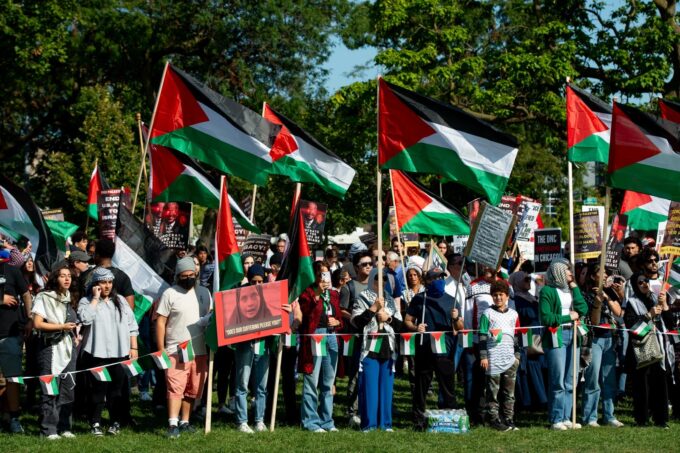Countering the DNC: A Vigil for Gaza

Photo by Steel Brooks.
The Democratic National Convention was happening here in Chicago — my city — and I sat frozen at my desk, staring at my computer. Earlier in my life, yeah, I’d have gone down to the United Center, linked arms with the sane and outraged, joined the cry: Stop funding genocide!
Instead, here I was, gawking at the event’s opening ceremony of day two: A pastor delivers a public prayer, at one point saying we should treat all humans “as sacred creations of the Almighty.” Huh? Is he serious? Does he really mean this? The word “sacredness” has been let loose; joined by “God.” Someone sings the National Anthem. The delegates recite the good ol’ Pledge of Allegiance, their hands ceremoniously pressed against their hearts. Then “God bless America” fills the hall.
The message I hear, quietly hovering behind the words, is this: Democrats are as patriotic as Republicans! Democrats are as religious as Republicans! We can put on a good show too — our clichés are fantastic.
Ceremony can matter, but when it’s basically just a curtain hiding reality . . . God help us all. I felt squeezed by fury and frustration. Oh, the platitudes of peace. I shut off my computer and decided, I’m gonna do it. Earlier I had received an email from the American Friends Service Committee, inviting me to an interfaith “Remember Gaza” vigil, happening that night at Montrose Harbor, a few miles from where I live.
Suddenly I felt called to be there, at this “interfaith vigil to honor those who have been killed in the genocide in Gaza, to highlight the urgent need for a permanent ceasefire and an end to U.S. weapons sales to Israel.”
The speakers would be Jewish, Muslim, Christian, as well as people who had lost loved ones in Gaza. And it would be taking place in the wake of the Biden administration’s latest approval of $20 billion in arms sales to Israel — you know, the reality the DNC event was hiding behind its curtain of faith and patriotism.
I had to do something besides sit in my study and stew. Attending a vigil on Lake Michigan at least seemed doable. Would it “solve” anything? Uh . . . maybe not, but I had to make my opposition to my country’s policy physically apparent, or so I heard my conscience scream from some deep inner place. The tricky part about this is that I’m an old klutz, with achy legs and a disintegrating ability to retain balance. Simply heading off to a lakefront vigil ain’t what it used to be.
I brought my cane and drove to Montrose Harbor. Fortunately, I left an hour early, just in case I ran into unexpected difficulties, which happened immediately. I’d forgotten how complex the area was and wound up parking . . . uh, nowhere near the actual site of the vigil. The park area was full of people: several volleyball games going on, families simply enjoying themselves. Music was playing. But nothing looked like a vigil in the process of organizing itself. I started fearing that the event had been canceled. I asked the hostess at a lakefront restaurant if she knew where the vigil was and she had no idea what I was talking about. Oh-oh . . .
By then I had been hobbling around for a mile or so, which (I hate to say it) is a lot more walking than I normally do. I felt exhausted. Grudgingly, I decided to leave — and then I saw a woman holding a Palestinian flag, directing traffic. Big wow. This was it! The vigil is about 500 yards from here, she told me, down a curving walkway. I kept hobbling. A short while later, a caring couple who were heading to the vigil stopped their car and gave me a ride the rest of the way.
Oh my God, I had made it. Things were just about to start. There may have been as many as 200 people sitting along the concrete steps facing the beach. The sun was setting, the sky was a beautiful reddish blue, the dark waves swooshed into shore.
“Our souls are tired,” a speaker lamented, and another speaker reminded us that the ground we were sitting on, this very moment, had been Hopi, Ojibway, Potawatomi homeland . . . forcibly taken through genocide. “Think of the many untold stories of genocide that happened right here on this land.”
That set the tone — for the poetry and grief and mourning, mixed with the sunset and the waves.
One speaker declared: “Kamala Harris and Tim Walz, we call upon you to remember the people of Gaza! Our country has the power to be a leader of peace. We want to vote for candidates that are pro-peace. Please give us that choice.”
In a different context, such words might seem trivial, easily shrugged off. But in that moment, they seemed not only deeply felt but real — as real as the wind that swept across the beach and stirred the waves.
A day later — what? I know that such words amount to virtually nothing by themselves. They only resonate when they are spoken in a context of commitment, plans and action, a la the civil rights movement. For now, as the DNC continues, I hear them not simply as a cry of hope but as an emerging certainty, the struggle for which will not stop.
No comments:
Post a Comment